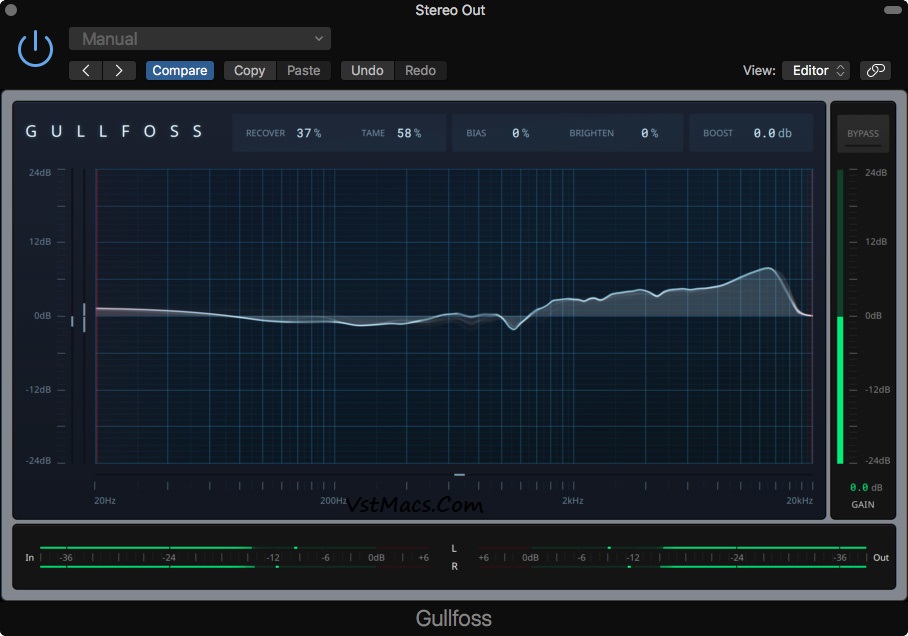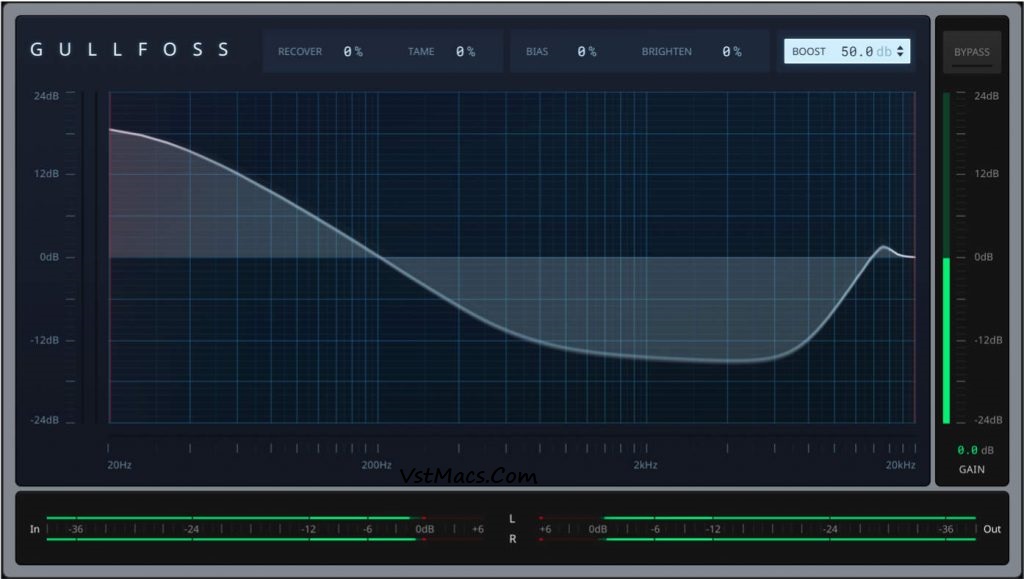Soundtheory Gullfoss VST Crack 1.10.0 With Mac Free Download

Soundtheory Gullfoss VST Crack is an easy-to-use tool for everyone from amateur musicians to professional mastering engineers. The clear user interface offers a number of basic parameters that can be adjusted to improve clarity, detail, spatiality and balance of a mix or recording in seconds. Soundtheory Gullfoss Mac Crack is a smart equalizer that listens to a signal and decides how to prepare the audio so that your brain can make the most of it. Gullfoss real-time analytics uses Soundtheory’s computerized auditory perception model to understand which audible elements are competing for your attention. Gullfoss allows fast and accurate fixes that would otherwise be insoluble or would require a lot of time and experience to resolve.
Many people dream of having a single control that simply makes things sound better, and while Soundtheory’s Gullfoss VST Mac Crack is not that simple, it is capable of extraordinary results despite having only five user parameters and an operation manual of just one. page. Currently, the plugin is available for Mac OS only, in AU, VST and AAX formats. It comes with a computer-based authorization plus a number of additional online authorizations to allow you to put Gullfoss on multiple machines; Online authorizations require the computer to be connected to the Internet during use, and only one of them can be used at a time.

Soundtheory Gullfoss Key Features:
- The Gullfoss Torrent trance mix has a number of problems: the noise filter sweep is quite aggressive. The vocal oohs are a little too resonant. Synth strings lack shine and texture. The piano in trance is not bright enough.
- The synth sticks under construction are a bit boring and the kick is a hint of a boom. In a medium domestication environment, Gullfoss removes the harshness of the filter sweep, reduces the resonance of the vocal pad, and tightens the kick.
- A little relaxation brings the strings to life and gives the trance piano and synthetic mallets attack and sparkle.
- All of this happens while keeping the rest of the mix. A great challenge when recording a violinist is the moving sound source during a performance.
- It’s nearly impossible to get a consistent sound, which often leads to uneven and unpleasant resonances, snare sounds, and mixing difficulties.
- This example features a violin with all of these problems and other instruments that have their own problems.
- Gullfoss uses the “Tame” function to enhance the sound and spatiality of the violin and to remove most of the snare. A short break adds clarity to the piano and raises the cello level for a more balanced mix.
- Our technology is fundamentally different from anything that has happened. It should be noted that Gullfoss does not use artificial intelligence (AI), neural networks, Fletcher-Munson curves, traditional DSP methods, or machine learning algorithms. Instead, Gullfoss is the first in a series of products that use our computer hearing technology. Watch out for the future as we have just started.
Soundtheory Gullfoss Key Features:
- Requires Mac OS X 10.9 or higher, Intel processor, AU-compliant 64-bit plug-in host, VST / VST3, or AAX Native
- Dynamic and smart equalizer plugin
- Based on the auditory perception model
- Change the frequency. response 100+ times per second
- Tame or recover audio items
- Transparent results
- Retains perceived dynamics
What happens when a theoretical physicist decides to design and build an EQ plug-in? The answer is Gullfoss, the first software from the new Soundtheory company, which is based on a computational auditory perception model and is described as a form of AI that dynamically analyzes and corrects its signal.
Gullfoss Mac Torrent transparently changes its frequency response more than 100 times per second while leaving the perceived dynamics intact and without introducing audible artifacts. Although on the surface it looks a lot like a form of dynamic EQ that relies on a pink noise curve, there is actually much more complex processing under the hood.
Tame the beast:
Gullfoss is currently available for the Mac, with a PC version due out later this year. A large graph in the middle of the plugin shows which parts of the spectrum are affected and there are five main controls across the top.
Essentially, the algorithm intelligently selects the elements of the audio signal that dominate or are being dominated in each area. If they are too prominent you can use Tame to bring them back to a better level, or if they are too hidden you can use Recover to help reveal them.
Aside from a smoother frequency distribution, the consequence of this balance is that each element is given more detail, clarity, spatial precision, and presence. Although these controls go up to 200%, we find that the best and most transparent results come from setting them to around 30-40%.
It also has a bias control that lets you weigh in on whether Gullfoss chooses to recall or tame in borderline cases, a brightness control to make the overall sound brighter or darker, and a boost control that applies a smile curve or increases the means in negative values.
Finally, it has high and low range limiters that can be activated to restrict the region of frequency that is being processed. It’s a simple set of controls that lets you dial in settings quickly, though we found ourselves wanting a bit more control over the location and amount of processing, and the shape of the Boost.
Do I really need this?
Gullfoss is a very interesting plugin that could be very useful for both beginners and experienced engineers. It can be used to instantly improve the clarity of mixes and tracks in a way that is impossible with normal EQs.
The other side of the coin is that it is also difficult to know exactly what is happening, and some may feel uncomfortable relying on such a seemingly simple tool. If you’re just starting to learn to mix, it’s probably best to brush up on your skills before resorting to a quick fix like this. However, if you are more interested in composition and want to quickly mix the results, it is worth a look.
Pay at the meter:
In other places, there are several meters to help show what is happening. On the left, there are two vertical meters on top of each other showing the Tame and Recover amounts, along with another vertical meter showing which of the two is favoring the Bias, plus a meter at the bottom of the spectrum showing how much brightness. is being added.
There are also input and output meters at the bottom, plus an output gain and bypass button on the right. Overall it is a clean and well designed GUI.
Enough descriptions though, how does this sound? Overall, it’s great for instantly enhancing mixes and tracks, but the effects are dependent on your audio. Although the most unbalanced mixes can be drastically improved with very little effort, the 40ms latency and high CPU impact can be more difficult to guarantee when used on well-mixed and balanced elements and the results are less obvious.
However, for the most part, everything benefited in some way. A track with a lot of hi-hats had the upper end of the transients clean to make the ticking sound more consistent.
It was interesting to see the frequency graph working through the pattern and using the recovery to essentially get the upper end out of the mix between each high hat hit. This way it was smoother than using an EQ as it was happening dynamically and the loudest, hardest hits were not being boosted.
Weightloss:
Elsewhere, we found that other tracks had smoothed-out low-mid bumps, although you must be careful not to take all the weight off by intentionally feeding a track with lots of bass. You can of course use the low range limiter to prevent Gullfoss from processing the low end, or you can use the Boost dial to add some bass again.
In fact, we got good results by allowing Gullfoss to smooth out the different low-end bass notes, then inserting an EQ with a low-shelf boost to bring the overall volume back up. That said, it would have been nice to have a little more control from within the plugin.
We also found that it worked wonders on vocal tracks, which can be notoriously uneven, and you can use the bandwidth controls to target only the hissing parts of the signal if you want to. With that in mind, we’ll be interested in trying this out for post-production tasks, as it could be called to quickly match a recorded voiceover or location sound.
As we’ve said, it’s hard to know what’s going on under the hood with Gullfoss, but ultimately the results speak for themselves. It gives recordings and mixes a smooth and airy quality that would be impossible to achieve with a traditional EQ. It won’t replace our other EQ plug-ins used for everyday cleaning and coloring tasks, but it’s a great additional tool to have in your arsenal.
Admittedly, the CPU hit is quite high, which means we’d choose to use it primarily as a mastering tool, but Soundtheory has made a fast graphics version available, which should improve performance on older machines. Building on Gullfoss, we’ll be very interested to see what Soundtheory comes up with next.

System Requirements:
Windows:
- Windows 10 64 bit
- Intel Core i5 / i7 / i9 / Xeon / AMD Quad-Core
- 8 GB RAM
- 8 GB free disk space on the system drive
Mac:
- Mac OS X 10.12.6 – 10.15
- Intel Core i5 / i7 / i9 / Xeon
- 8 GB RAM
- 8 GB free disk space on the system drive
How to Install Soundtheory Gullfoss VST Crack?
- First of all, download Soundtheory Gullfoss VST Crack.
- Then run Crack and generate the activation key.
- Now it’s done.
- Complete installation procedure.
- Then enjoy
Download Link is Given Below…
